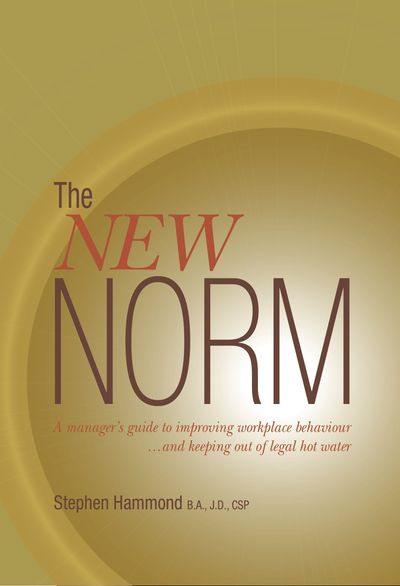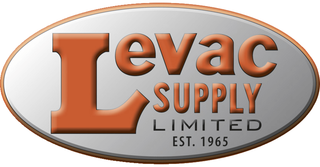Chapter seventeen
THE NEW NORM knows there’s more to sexual harassment than just sex
With so many years of education about sexual harassment, most people have figured out what’s what. Don’t make sexual demands in exchange for a job or a promotion. Check. Don’t grab someone inappropriately…in fact just don’t grab anyone. Check. Don’t start any workplace sentence with, “Hey sweetie.” Check. Don’t drool as you tell your colleague how sexy he looks. Check. For the most part we have the fundamentals.
However, we might find ourselves in trouble if we just stick to the fundamentals and don’t realize sexual harassment is way more than just sex. Take for example, Carol Shaw.
Shaw worked for Levac Supply Ltd. for fourteen years where she was continually teased and ridiculed by fellow employee Herb Robertson. Robertson teased her because he felt she was overweight. She could hear him say “waddle, waddle” when other overweight women walked around the office and he mimicked the swishing sound of her nylons rubbing together because of weight. He called her and another woman the “fridge sisters.
Shaw went to her boss, who was the owner of the company, Roger Levac, complaining about Robertson’s comments on a number of occasions, but he did nothing to stop it. Therefore Shaw eventually resigned and went to the Ontario Human Rights Commission, saying she was sexually harassed. She asked for compensation for the violation of her rights and for pay in lieu of notice for having to leave her job.
Most of us may think, while this is harassment, it doesn’t seem like sexual harassment. Yet Shaw’s case was decided eighteen months after the Supreme Court of Canada came forward with its liberal definition of sexual harassment.
The chief justice wrote, “Without seeking to provide an exhaustive definition of the term, I am of the view that sexual harassment in the workplace may be broadly defined as unwelcome conduct of a sexual nature that detrimentally affects the work environment or leads to adverse job-related consequences for the victims of the harassment.”
It's clear that this employer could have benefited from taking my Respectful Workplace online course, where we spell out management’s responsibility to deal with sexual harassment and sex discrimination.
Back to the Shaw case, after all the evidence was put forward, the human rights adjudicator found two significant reasons for his ruling. One is the different treatment the women received, versus the men. Robertson made derogatory comments only to or about women. He didn’t make the same comments to or about men over the fourteen years he was at the firm. Hence the negative comments Shaw endured were considered sexual harassment, a form of sex discrimination.
As for the second main reason, the adjudicator wrote: “It seems to be incontestable that to express or imply sexual unattractiveness is to make a comment of a sexual nature. Whether the harasser says ‘you are attractive and I want to have sex with you,’ or says ‘you are unattractive and no one is likely to want to have sex with you,’ the reference is sexual. It is verbal conduct of a sexual nature, and it is sexual harassment in the workplace if it is repetitive and has the effect of creating an offensive working environment; it is sexual harassment in the form of an inappropriate comment of a sexual nature.”
Carol Shaw was sexually harassed and awarded $43,273 for lost income and expenses and $5,000 for general damages. Herb Robertson, the co-worker, and Roger Levac, the owner, were found jointly liable.
This case illustrates that there is much more to sexual harassment than most people realize. And to be clear, this adjudicator wasn’t saying overweight or perceived overweight women are sexually unattractive. He was saying that Herb Robertson, when making these comments, could make a person feel sexually unattractive.
We all have interests in different body types and comforts with our own bodies, but even the person with the best self-esteem starts questioning how they look, or what they feel about themselves when they have to put up with these kinds of derogatory comments for literally years.
This case was decided in 1990, so it’s old law that has never been overturned by a court: It’s not like something new just sprang up, catching us by surprise. Since that time, numerous other cases have classified many inappropriate workplace behaviours as sexual harassment, so we need to keep up and ensure our workplaces are sexual-harassment-free.
The OLD NORM
- likes to point out people in the workplace with great bodies and not-so-great bodies. “I’m human! What am I going to do?”
- strangely enough, only points out the bodies of the gender that interests him.
- will always compliment a colleague about her looks, but never gives a compliment about her work.
- won’t put a stop to such behaviours if he’s the supervisor. “We’re all adults. You figure it out.”
The NEW NORM
- doesn’t make jokes or derogatory comments about the weight, size or shape of people at work.
- agrees that “we’re human” and may have thoughts that judge people based on physical characteristics, but he’d never verbalize them and wouldn’t act on them.
- enjoys occasionally complimenting colleagues on how they look, as well how well they do their work.
- if he supervises people at work, will put an end to derogatory comments, thereby ensuring no violation of rights.
Suggestions for the New Norm:
01
Don’t worry about the law. A client of mine said she wants her managers to think, “Don’t be afraid of the law. Be afraid of being a bad employer.” Most of the inappropriate “stuff” that goes on at work shouldn’t send us to our law journals or our lawyers to find out if the behaviour is wrong. Most of us know when something is wrong. Perhaps we’ll get a game show question wrong about exactly which law it’s breaking, but we have enough smarts to know it’s wrong. Sure, stay current with the law. But better still, just squelch the bad “stuff” and you won’t have to worry about the law.
02
Okay, worry just enough about the law. It’s still important to keep up with legal changes to ensure people at work have at least the fundamentals. Education never hurts, and it can help keep the big legal bills away.
03
Be wary of the constant complimenter. Who doesn’t like a compliment? If it’s done sincerely, it’s often flattering. But women in particular sometimes say, “I don’t mind a compliment once in a while, but how come it’s only about my looks and not my work?”
This chapter lets you know all the basics about sexual harassment in the workplace. For examples of other important information about sexual harassment and sex discrimination, consider reading Chapter 1: The New Norm doesn’t let his libido get in the way of his work.
Purchase a copy of The New Norm, or if you think all your supervisors and managers, could learn many valuable lessons about creating a respectful workplace, free of harassment, bullying and discrimination, you can get volume discounts.
What one reader has to say about Stephen’s book, The New Norm
“Stephen’s book is a brilliant reminder of workplace situations that are disturbing, yet slip by unaddressed by so many in both the private and public sector. When these behaviours are unaddressed, they become the norm because we allow them to be.
Just like his first book, Stephen is insightful, his writing is moving and he inspires his readers to take immediate action to disapprove of, and address harassment and other inappropriate behaviour every time we see it, feel it and hear about it. In a concise format, he gives us a series of snapshots of old vs. new, acceptable vs. unacceptable, right vs. wrong, in a way that is understandable.
If workplace leaders take just some of Stephen’s practical advice, they will go a long way to rid their workplace of unacceptable behaviours such as harassment, discrimination and bullying. It’s clear that to create Stephen’s “New Norm,” we need to ACT NOW! We can’t wait any longer.”
Tatjana Zatezalo
Manager, Organizational Development, Halifax Regional Municipality

Respectful Workplace Online Training Course
If you, your employees or your managers want more information,
sign up for my new online training course:
The Respectful Workplace in Canada.
With 10 modules of useful, relevant and current information,
this course can help everyone at your workplace.
This may be the best online harassment training your people will get.
Stephen Hammond is a lawyer turned speaker and consultant in the field of harassment, sexual harassment, bullying and discrimination at work.
The New Norm is Stephen’s third book.
Here’s more information about Stephen.




